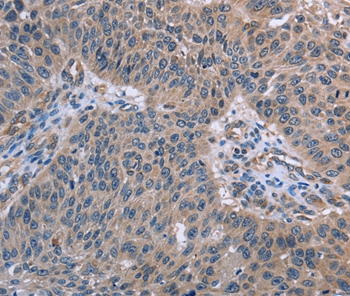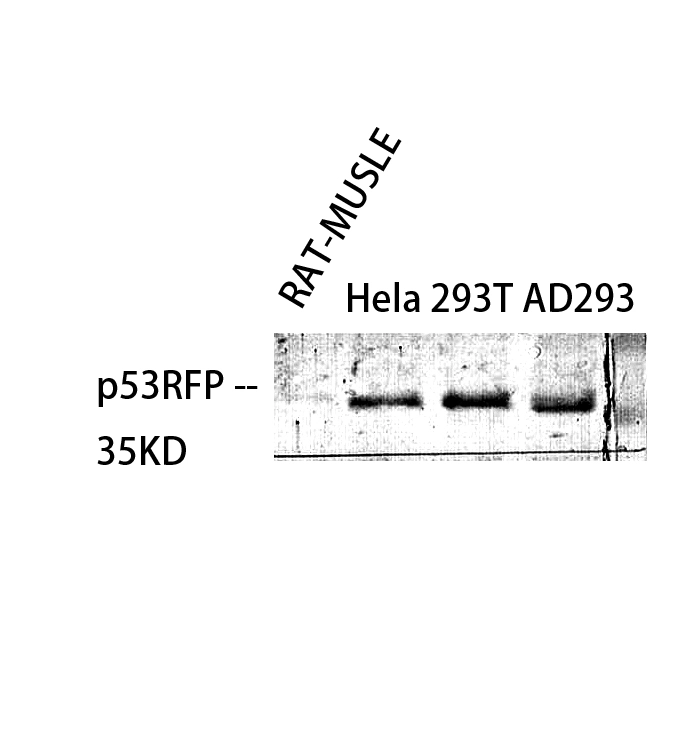![FACS analysis of HEK293T cells transfected with either RNF144B plasmid(Red) or empty vector control plasmid(Blue) using GTX83705 RNF144B antibody [11F4]. FACS analysis of HEK293T cells transfected with either RNF144B plasmid(Red) or empty vector control plasmid(Blue) using GTX83705 RNF144B antibody [11F4].](https://www.genetex.com/upload/website/prouct_img/normal/GTX83705/GTX83705_134_FACS_w_23061420_136.webp)
FACS analysis of HEK293T cells transfected with either RNF144B plasmid(Red) or empty vector control plasmid(Blue) using GTX83705 RNF144B antibody [11F4].
RNF144B antibody [11F4]
GTX83705
ApplicationsFlow Cytometry, ImmunoFluorescence, Western Blot, ImmunoCytoChemistry
Product group Antibodies
ReactivityHuman
TargetRNF144B
Overview
- SupplierGeneTex
- Product NameRNF144B antibody [11F4]
- Delivery Days Customer9
- Application Supplier NoteWB: 1:1000-1:2000. ICC/IF: 1:50-1:100. FACS: 1:100. *Optimal dilutions/concentrations should be determined by the researcher.Not tested in other applications.
- ApplicationsFlow Cytometry, ImmunoFluorescence, Western Blot, ImmunoCytoChemistry
- CertificationResearch Use Only
- ClonalityMonoclonal
- Clone ID11F4
- Concentration0.8 mg/ml
- ConjugateUnconjugated
- Gene ID255488
- Target nameRNF144B
- Target descriptionring finger protein 144B
- Target synonymsIBRDC2, PIR2, bA528A10.3, p53RFP, E3 ubiquitin-protein ligase RNF144B, IBR domain containing 2, IBR domain-containing protein 2, p53-inducible RING finger protein
- HostMouse
- IsotypeIgG1
- Protein IDQ7Z419
- Protein NameE3 ubiquitin-protein ligase RNF144B
- Scientific DescriptionE3 ubiquitin-protein ligase which accepts ubiquitin from E2 ubiquitin-conjugating enzymes UBE2L3 and UBE2L6 in the form of a thioester and then directly transfers the ubiquitin to targeted substrates such as LCMT2, thereby promoting their degradation. Induces apoptosis via a TP53/p53-dependent but caspase-independent mechanism. However, its overexpression also produces a decrease of the ubiquitin-dependent stability of BAX, a pro-apoptotic protein, ultimately leading to protection of cell death - But, it is not an anti-apoptotic protein per se.
- ReactivityHuman
- Storage Instruction-20°C or -80°C,2°C to 8°C
- UNSPSC12352203

![FACS analysis of Jurkat cells using GTX83705 RNF144B antibody [11F4]. Red : Primary antibody Blue : Negative control antibody FACS analysis of Jurkat cells using GTX83705 RNF144B antibody [11F4]. Red : Primary antibody Blue : Negative control antibody](https://www.genetex.com/upload/website/prouct_img/normal/GTX83705/GTX83705_133_FACS_w_23061420_308.webp)
![FACS analysis of HeLa cells using GTX83705 RNF144B antibody [11F4]. Red : Primary antibody Blue : Negative control antibody FACS analysis of HeLa cells using GTX83705 RNF144B antibody [11F4]. Red : Primary antibody Blue : Negative control antibody](https://www.genetex.com/upload/website/prouct_img/normal/GTX83705/GTX83705_132_FACS_w_23061420_716.webp)
![ICC/IF analysis of HeLa cells using GTX83705 RNF144B antibody [11F4]. ICC/IF analysis of HeLa cells using GTX83705 RNF144B antibody [11F4].](https://www.genetex.com/upload/website/prouct_img/normal/GTX83705/GTX83705_783_ICCIF_w_23061420_807.webp)
![WB analysis of HEK293T cells transfected with RNF144B plasmid (Right) or empty vector (Left) for 48 hrs using GTX83705 RNF144B antibody [11F4]. Loading : 5 ug per lane WB analysis of HEK293T cells transfected with RNF144B plasmid (Right) or empty vector (Left) for 48 hrs using GTX83705 RNF144B antibody [11F4]. Loading : 5 ug per lane](https://www.genetex.com/upload/website/prouct_img/normal/GTX83705/GTX83705_3833_WB_w_23061420_328.webp)
![ICC/IF analysis of COS7 cells transiently transfected with RNF144B plasmid using GTX83705 RNF144B antibody [11F4]. ICC/IF analysis of COS7 cells transiently transfected with RNF144B plasmid using GTX83705 RNF144B antibody [11F4].](https://www.genetex.com/upload/website/prouct_img/normal/GTX83705/GTX83705_782_ICCIF_w_23061420_941.webp)

![IHC-P analysis of human colon tissue using GTX83704 RNF144B antibody [9H10]. Antigen retrieval : Heat-induced epitope retrieval by 10mM citrate buffer, pH6.0, 100oC for 10min.](https://www.genetex.com/upload/website/prouct_img/normal/GTX83704/GTX83704_1742_IHC-P_w_23061420_418.webp)





